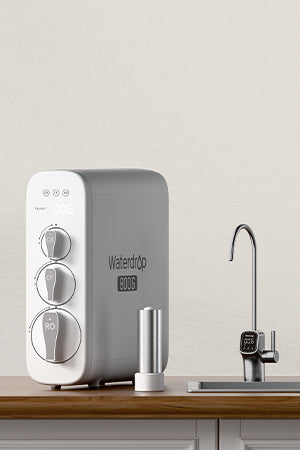Water is part of our daily lives. We drink it, bathe in it, cook with it, and even enjoy it as ice in our favorite drinks. But have you ever thought about why ice floats or why ocean water feels different from tap water? The answer lies in one simple but powerful property: density.
The density of water is approximately 1 gram per cubic centimeter (1 g/cm³) at 4°C (39.2°F). This is the standard reference used in science and everyday comparisons. It means that one cubic centimeter of pure water weighs exactly one gram.
What Does Density Mean?
Let's break it down simply. Imagine carrying two same-sized bottles — one filled with feathers and one with marbles. Which one feels heavier? The bottle with marbles. That's because it's denser.
In science, density tells us how much mass (stuff) is packed into a certain volume (space). The formula is:
You don't need to memorize the formula. Just remember: if something has more weight in the same space, it's denser.
What Is the Density of Water?
The density of pure water is about 1 gram per cubic centimeter (1 g/cm³) when it's around 4°C (39.2°F) — that's roughly the temperature inside your fridge.
This number, 1 g/cm³, is a science standard. It means 1 cubic centimeter (about the size of a sugar cube) of water weighs exactly 1 gram. It's a neat, round number and used as a reference for comparing other liquids.
So, when people say “this liquid is lighter or heavier than water,” they're comparing it to this baseline.
Does Water's Density Change?
Yes, water's density isn't always the same. It depends on three main factors: temperature, salt, and pressure. Here's how they show up in everyday life.
Temperature: From Your Fridge to a Boiling Kettle
Ever noticed how cold water from the fridge feels heavier than warm tap water? That's not your imagination.
- Cold water (until about 4°C) is denser — the molecules are packed closer together.
- Hot water is less dense — the molecules move more and spread out.
That's why, when you pour hot and cold water into a tall glass at the same time (carefully!), the cold water sinks while the hot water rises.
And when water freezes, something strange happens: the molecules form a structure that takes up more space — making ice less dense than water. That's why ice cubes float in your lemonade.
Salt Content: From the Kitchen to the Ocean
When you cook pasta and add salt to boiling water, you're increasing
the density of the water . Why is this happening?
Adding salt means there's more mass in the same space.
The result: saltwater is denser than freshwater.
In nature, this difference is even more noticeable. If you've ever floated easily in the sea but sunk like a stone in a swimming pool, that's the salt at work!
Ocean water is naturally salty and denser, making it easier to float.
Pressure: From the Surface to the Deep Sea
This doesn't affect our daily lives much, but deep in the ocean, the water is under high pressure — and that can squeeze molecules closer together, increasing density slightly. It's why submarines and deep-sea creatures need special designs to handle these conditions.
Why Water Density Matters in Everyday Life
Water density might seem like a science term, but it impacts us more than we realize. Here are some familiar examples:
1. Ice in Your Drinks
You add ice to a soda or a cocktail, and it floats. That's because ice is less dense than liquid water. This simple fact makes a big difference — it cools your drink from the top down, without sinking to the bottom.
Without this property, all the ice in the world would sink to the bottom of lakes and oceans, causing huge changes in ecosystems.
2. Floating in the Pool vs. the Ocean
If you've ever swum in the Dead Sea or another salty body of water, you'll know how easy it is to float. That's because saltwater is denser, so your body doesn't sink as much. The denser the water, the easier it holds you up.
It's also why people use Epsom salt baths — denser water feels more buoyant and relaxing.
3. Cooking and Recipes
Believe it or not, water density even affects how food cooks. When you boil soup, add oil, or make broths, the way ingredients float or sink often depends on density.
For example, ever notice how oil floats on top of water? That's because oil is less dense than water. This is why you see a shiny layer of oil on your soup.
4. Weather and Climate
Water density plays a key role in ocean currents, which help
control the Earth's climate . These currents move warm and cold water around the planet — kind of like a giant heating and cooling system.
Cold, salty water sinks to the bottom.
Warm, less salty water rises.
This up-and-down motion helps move nutrients in the ocean and even affects weather patterns.
5. Washing Clothes and Dishes
Water's density helps with cleaning, too. Some dirt particles sink because they're denser than water, while others float. Detergents are designed to work with water's properties, including its density, to help lift grime from clothes or dishes.
What Happens When Water Changes Form?
Water can exist as a solid (ice), liquid (water), or gas (steam) — and each form has its own density.
- Ice takes up more space than the same amount of liquid water, so it's less dense.
- Liquid water is the densest form, especially around 4°C.
- Steam spreads out the most — it's very low in density.
This explains everyday observations:
- Ice floats.
- Water pours.
- Steam rises and disappears into the air.
Final Thoughts: Why It's Worth Knowing
You don't need to be a scientist to appreciate water's amazing properties. From a floating ice cube to the waves in the ocean, density is behind it all.
So next time you sip a cold drink, take a bath, or walk by the sea, you'll know there's some fascinating science at play. Water's density helps shape our daily experiences — quietly, but powerfully.









































































